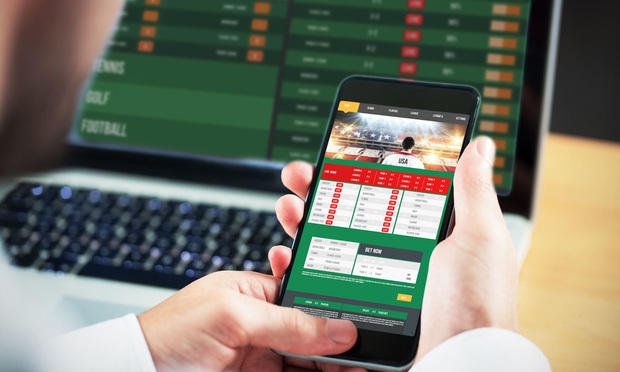Q&A: O'Melveny Practice Leader Covers the Sports-Betting Blitz
O'Melveny & Myers sports industry co-chair Irwin Raij: "There's excitement about potential opportunities. For many years, this was not a discussion point, irrespective of the monetization opportunities."
February 01, 2019 at 11:09 AM
7 minute read

How much would you bet on the Patriots winning the coin toss at this Sunday's Super Bowl? Or maybe you want to wager on Patriots tight end Ron Gronkowski scoring the game winning touchdown, or Greg “The Leg” Zuerlein nailing a 57-yard kick for the Rams.
Super Bowl LIII is not just about crowning the best professional football team in 2019. It's also, thanks to the U.S. Supreme Court, the first national step into an expanded world of legal sports gambling.
This year more states than ever before will allow bets on Sunday's big game. Wagers are legal in eight states: Delaware, Mississippi, Nevada, New Jersey, New Mexico, Pennsylvania, Rhode Island and West Virginia. The Supreme Court's decision last term in Murphy v. NCAA permitted any state to legalize sports betting, and there is movement in 29 other states towards opening their doors, according to ESPN's sports betting bill tracker.
Irwin Raij, co-chairman of the sports industry group at O'Melveny & Myers in New York, vividly remembers May 14 when the justices issued their 6-3 decision. He was in the middle of a sports team transaction and lawyers scrambled to see if the ruling affected the transaction. It didn't, but he said he knew then it could affect future transactions and a lot more in the legal world.
Raij joined O'Melveny in 2017 after 16 years at Foley & Lardner and before that stints in the Clinton White House counsel's office and in-house counsel to Gore 2000. As preparations were underway for game day, he spoke with The National Law Journal about the impact of the Supreme Court's decision on the practice of sports law. The conversation that follows was edited for length and clarity.
➤➤ NLJ: Are other firms expanding in this area because of the Supreme Court decision?
Raij: I think a lot of firms are paying attention to the states. In the end, it's about business and generating revenues and making things happen, but there's more to it than that. There have been firms in the sports space for a long time and we've seen more firms get into it or expand the practice. It's amazing to see the business evolve. Who are the people buying teams today? A lot of them are hedge funds. You may have a natural platform to cross over to those potential investors in sports.
➤➤ Tell us more about the firm's sports industry group.
The year I came over, there was a concerted effort to reconstruct the sports practice. Historically the entertainment, sports and media practice had been in existence since the beginning of the firm and it helped Hollywood become Hollywood. We were one of the key firms in the entertainment industry for many years and still are strong. On the sports side, sports is entertainment and just runs under a different set of rules and construct. So we came together to have a dedicated, organized effort to help the firm focus on the business of sports. We always had a litigation side, but we're really building up the transactional side of sports.
➤➤ Did the Supreme Court decision affect your practice?
I decided to launch an interdisciplinary task force that combined our group with others working on white-collar, cryptocurrency, money laundering and other issues that could come up. My practice is a little bit of everything. Personally, over 50 percent of my practice is on the stadium development side of the equation. How do you build or renovate stadiums, create unique financing structures, deal with complicated political stories. I love that kind of work. There's no straight line to it. It requires at times patience, creativity, a willingness to listen. It's all about bringing people together. Gambling is now an interesting question and how it impacts all of that work. Outside of that, it's M&A work. I'm counsel for a start-up team and I'm working with a group that wants to buy sports teams.
 Irwin Raij
Irwin Raij➤➤ What's been the impact of the Supreme Court's sports betting decision?
There's excitement about potential opportunities. For many years, this was not a discussion point, irrespective of the monetization opportunities. The leagues aren't legalizing gambling. The Supreme Court said it's the states' right and so some of the stigma of gambling is disappearing, not unlike some other stigmas in society. We've seen an acceptance and that has led to a whole discussion about how to monetize it.
No doubt we're going to see a significant revenue spike for all the leagues. States are interested from a revenue/taxing perspective. The leagues are interested not only from a monetization perspective, but they can develop new analytics on their customers. Millions of people have been betting offshore or illegally, and all of a sudden that information, there is the opportunity to collect it. Who they are? The more information you collect, the more you can monitor and protect integrity and enforcement in gambling.
It will affect real estate development, intellectual property, media rights and television content—I think it will have tremendous long-term impacts.
We don't know everything yet but there sure seems to be an avalanche of opportunities while everyone figures out how this is going to work. Even while we're doing that, there are revenue opportunities.
➤➤ What are the downsides, if any, of the high court's decision?
The legalization of this should help with some of what people viewed as illicit elements of sports betting. There will be more comfort for people to do it publicly, more enforcement mechanisms. If we do it right, there should be better ways of addressing some of those potential negatives—risky behaviors, gambling addictions. This is something the Hatch-Schumer bill last year tried to address.
It should get us into a broader discussion of what is gambling and what is good and bad about gambling. There are concerns about federal laws like the wire act, the bribery act and interstate commerce issues. It would make sense for Congress to act to help states make decision. I don't know that there's any momentum as of today to get something done this year. Things could change. If there's one scandal, you'll see legislation quick.
➤➤ Most important question: Who is your pick to win the Super Bowl?
I'm Cuban American from Miami. I'm a Miami Dolphins fan. I've been in the cellar for so many years now, it's just painful. I don't care who wins this year. Let it be a fun game. I will watch. I'm looking forward to the commercials.
Read more:
Banks, Justice Dept. Opinions Differ on Online Gambling
Stacey Abrams Debuts Super Bowl Ad Demanding Election Reform
Super Bowl Work Kept Dozens of King & Spalding Lawyers Busy
Proskauer, O'Melveny Headline Record-Setting Panthers Deal
NY Gaming Commission Proposes Regulations to Establish Sports Betting
This content has been archived. It is available through our partners, LexisNexis® and Bloomberg Law.
To view this content, please continue to their sites.
Not a Lexis Subscriber?
Subscribe Now
Not a Bloomberg Law Subscriber?
Subscribe Now
NOT FOR REPRINT
© 2025 ALM Global, LLC, All Rights Reserved. Request academic re-use from www.copyright.com. All other uses, submit a request to [email protected]. For more information visit Asset & Logo Licensing.
You Might Like
View All
'Erroneous Rulings'?: Wilmer Asks 4th Circuit to Overturn Mosby's Criminal Convictions
3 minute read

DC Circuit Revives Firefighters' Religious Freedom Litigation in Facial Hair Policy Row
3 minute read
Federal Judge Pauses Trump Funding Freeze as Democratic AGs Plan Suit
4 minute readTrending Stories
- 1Public Notices/Calendars
- 2Wednesday Newspaper
- 3Decision of the Day: Qui Tam Relators Do Not Plausibly Claim Firm Avoided Tax Obligations Through Visa Applications, Circuit Finds
- 4Judicial Ethics Opinion 24-116
- 5Big Law Firms Sheppard Mullin, Morgan Lewis and Baker Botts Add Partners in Houston
Who Got The Work
J. Brugh Lower of Gibbons has entered an appearance for industrial equipment supplier Devco Corporation in a pending trademark infringement lawsuit. The suit, accusing the defendant of selling knock-off Graco products, was filed Dec. 18 in New Jersey District Court by Rivkin Radler on behalf of Graco Inc. and Graco Minnesota. The case, assigned to U.S. District Judge Zahid N. Quraishi, is 3:24-cv-11294, Graco Inc. et al v. Devco Corporation.
Who Got The Work
Rebecca Maller-Stein and Kent A. Yalowitz of Arnold & Porter Kaye Scholer have entered their appearances for Hanaco Venture Capital and its executives, Lior Prosor and David Frankel, in a pending securities lawsuit. The action, filed on Dec. 24 in New York Southern District Court by Zell, Aron & Co. on behalf of Goldeneye Advisors, accuses the defendants of negligently and fraudulently managing the plaintiff's $1 million investment. The case, assigned to U.S. District Judge Vernon S. Broderick, is 1:24-cv-09918, Goldeneye Advisors, LLC v. Hanaco Venture Capital, Ltd. et al.
Who Got The Work
Attorneys from A&O Shearman has stepped in as defense counsel for Toronto-Dominion Bank and other defendants in a pending securities class action. The suit, filed Dec. 11 in New York Southern District Court by Bleichmar Fonti & Auld, accuses the defendants of concealing the bank's 'pervasive' deficiencies in regards to its compliance with the Bank Secrecy Act and the quality of its anti-money laundering controls. The case, assigned to U.S. District Judge Arun Subramanian, is 1:24-cv-09445, Gonzalez v. The Toronto-Dominion Bank et al.
Who Got The Work
Crown Castle International, a Pennsylvania company providing shared communications infrastructure, has turned to Luke D. Wolf of Gordon Rees Scully Mansukhani to fend off a pending breach-of-contract lawsuit. The court action, filed Nov. 25 in Michigan Eastern District Court by Hooper Hathaway PC on behalf of The Town Residences LLC, accuses Crown Castle of failing to transfer approximately $30,000 in utility payments from T-Mobile in breach of a roof-top lease and assignment agreement. The case, assigned to U.S. District Judge Susan K. Declercq, is 2:24-cv-13131, The Town Residences LLC v. T-Mobile US, Inc. et al.
Who Got The Work
Wilfred P. Coronato and Daniel M. Schwartz of McCarter & English have stepped in as defense counsel to Electrolux Home Products Inc. in a pending product liability lawsuit. The court action, filed Nov. 26 in New York Eastern District Court by Poulos Lopiccolo PC and Nagel Rice LLP on behalf of David Stern, alleges that the defendant's refrigerators’ drawers and shelving repeatedly break and fall apart within months after purchase. The case, assigned to U.S. District Judge Joan M. Azrack, is 2:24-cv-08204, Stern v. Electrolux Home Products, Inc.
Featured Firms
Law Offices of Gary Martin Hays & Associates, P.C.
(470) 294-1674
Law Offices of Mark E. Salomone
(857) 444-6468
Smith & Hassler
(713) 739-1250








